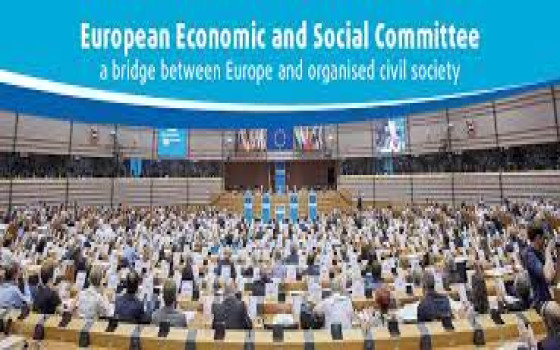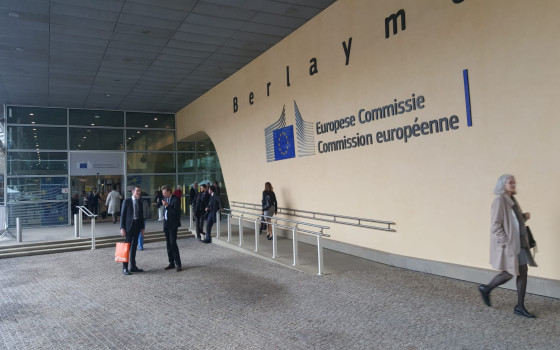European Commission: Discussions on Cohesion Policy and Foreign Policy in a New Geopolitical Reality, Democracy and Digitalization... with the attendance of officials from federal institutions and civil society and economic organizations

- Europe and Arabs
- Tuesday , 29 April 2025 9:15 AM GMT
Brussels: Europe and the Arabs
The European Economic and Social Committee (EESC) is hosting a debate on the EU Cohesion Policy Review with Commission Vice-President Rafael Vito, in a plenary session on April 29 and 30 at the European Commission headquarters in Brussels.
The debates will begin this Tuesday afternoon with a debate on the midterm review of cohesion policy with Rafael Vito, Executive Vice-President of the European Commission for Cohesion and Reforms. A debate on EU foreign policy in a new geopolitical reality will also be held with Iraçe García Pérez and Marie-Agnes Strack-Zimmermann, Members of the European Parliament; Fabien Zulig, Chief Executive Officer and Chief Economist at the European Policy Centre; and Pierre Haroche, Defence Research Associate at the Jacques Delors Institute and Senior Lecturer at the Catholic University of Lille.
A panel discussion on democracy and digitalization will be held with Brando Benifei, Member of the European Parliament and Co-Rapporteur on the Law of Artificial Intelligence; and Everna McGowan, Technology and Human Rights Advisor at the Office of the UN Deputy High Commissioner for Human Rights. Udbhav Tiwari, Vice President of Strategy and Global Affairs at the Signal Foundation; Marthe Nagels, Head of Participatory Strategies at Make.org; and Alina Radu, Director of the investigative newspaper "Ziarule di Garda" in the Republic of Moldova.
Tomorrow's program, Wednesday, April 30, 2025, will include a session on the road to the next multiannual financial framework with Carla Tavares, Member of the European Parliament, related to Opinion ECO/662 - The road to the next multiannual financial framework. According to a statement issued by the Economic and Social Committee in Brussels, in response to the European Commission's proposals to review the cohesion policy regulations, the European Economic and Social Committee supports a practical mid-term review of EU cohesion policy for the period 2021-2027. The Committee recognizes that changing geopolitical, economic, and environmental circumstances require a more flexible and strategically targeted approach, while cautioning against losing sight of the fundamental objective of cohesion policy: reducing regional inequalities. European Semester
Organized Civil Society Perspectives in EU Member States on National Reform and Investment Proposals and Their Implementation (European Semester 2024-2025) (ECO/651, Rapporteurs: Constantinos Diamantoros (EL-I), Javier Doz Orit (ES-II), Luca Jahier (IT-III))
In this information report, the European Economic and Social Committee summarizes the views of organized civil society in all EU Member States on national reform and investment proposals for the 2024-2025 European Semester. The report is based on 27 national contributions and provides practical insights into the implementation of country-specific recommendations, recovery and resilience plans, and medium-term fiscal and structural plans. It emphasizes the need for structured consultations and meaningful dialogue between governments, the European Commission, and civil society stakeholders. More
European Economic and Social Committee Recommendations on Reform and Investment Proposals, prepared as part of the 2024-2025 European Semester (ECO/652, Rapporteurs: Konstantinos Diamantoros (EL-I), Javier Doz Orret (ES-II), Luca Jahier (IT-III))
In this self-initiated opinion, the Committee calls for a more citizen-centric and participatory European economic governance. It urges that decisions at the national and federal levels reflect real needs through inclusive dialogue with civil society, trade unions, and employers. In its role in the European Semester, and based on a parallel report with national inputs, the Committee provides policy recommendations to strengthen reform plans, democratic legitimacy, and the EU's crisis response. It focuses on country-specific recommendations for 2024, the new medium-term structural fiscal plans, and the ongoing recovery and resilience plans. The Cost of Living Crisis
Measures for a Resilient, Cohesive and Inclusive European Economy (ECO/661, Rapporteur: Elena-Alexandra Calistro (RO-III))
The Commission sets out a comprehensive strategy to address the ongoing cost of living crisis and strengthen the EU's long-term economic and social resilience. More specifically, the EESC considers that the challenges and uncertainties facing the EU do not require incremental adjustments, but rather a radical rethinking of the EU's economic model. This Opinion, with its focus on the economic dimension, represents the starting point for a series of coordinated recommendations to address the cost of living crisis from across the Commission, which will be presented in the coming months.
Rising transport, energy and housing prices: The role of quality public services in addressing the rising cost of living (TEN/846, Rapporteur: Thomas Kättenig (AT-II))
In this Opinion, issued on its own initiative and part of the EESC's set of Opinions to address the cost of living crisis, the Commission says it is essential to focus on investment in infrastructure, competitiveness and essential public services to address the alarming cost of living crisis in Europe. The EU must aim to create high-quality jobs and produce clean, affordable energy in Europe, while ensuring that no one is left behind, particularly with regard to mobility and energy poverty.
Phasing Out Fossil Fuel Subsidies While Ensuring European Competitiveness, Mitigating the Cost of Living Crisis, and Promoting a Just Transition (NAT/946, Rapporteur: Corina Andrea Morava Pinga (RO-III))
In this Opinion issued on its own initiative, included in the European Economic and Social Committee (EESC) Compilation of Opinions on the Cost of Living Crisis, the Committee stresses the need for a coordinated, socially responsible, and globally consistent approach to phasing out fossil fuel subsidies. The EU should continue to advocate for the global phase-out of fossil fuel subsidies and strengthen partnerships with countries that are making progress in this area.
How Single Market Imbalances Contribute to the Rising Cost of Living (INT/1078, Rapporteur: Emilie Brouzet (France-Ireland))
In this Opinion, which forms part of a broader EESC initiative to address the cost of living crisis, the Committee warns that the fragmentation of the single market is costing the EU economy up to €500 billion annually. It calls on the EU to urgently address persistent barriers that undermine competitiveness and affect the cost of living, such as regional supply constraints. More
Budget
The Road to the Next Multiannual Financial Framework (ECO/662, Rapporteurs: Constantinos Diamantouro (EL-I), Stefano Palmieri (IT-II), Elena-Alexandra Calistro (RO-III))
The European Economic and Social Committee sets out strategic recommendations for the EU's next multiannual financial framework beyond 2027. This opinion comes at a pivotal moment, as the EU prepares to align its long-term budget with rising geopolitical tensions, economic uncertainty, and urgent climate and social challenges. The Committee calls for a radical rethink of how the EU budget is structured, financed, and allocated to ensure it can deliver genuine European public goods and support resilience, competitiveness, and cohesion in the long term. Competitiveness
Investments and Reforms for Competitiveness and the Capital Markets Union (ECO/665, Rapporteurs: Dominika Begon (DE-II), Antonio García del Riego (ES-I), Giuseppe Guerini (IT-III))
In this exploratory opinion, the European Economic and Social Committee calls for bold investments and fiscal reforms to close the EU's competitiveness gap and make the Capital Markets Union (CMU) a reality. In the context of rising geopolitical tensions and urgent investment needs for green and digital transformations, the EESC highlights the urgent need to fill Europe's financing gap. This opinion contributes to the ongoing debate on EU economic governance, particularly the design of the next multiannual financial framework and future fiscal rules.














No Comments Found